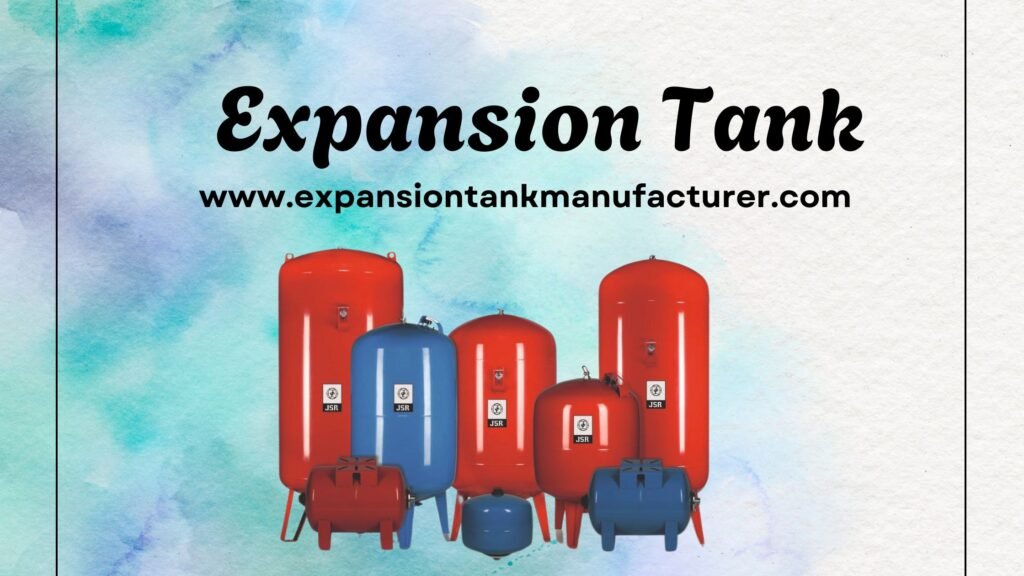Delightful, rapidly expanding infrastructural facilities and hectic industrial sector-based Delhi also bear with extreme weathers ranging from summer to chilling winters. In such conditions, good Heating, Ventilation, and Air Conditioning systems are indispensable in residential and commercial buildings, so expansion tanks work as pressure-stable tools to provide efficiency of the system, keeping it safely on track.
In this blog, we will explore the importance of expansion tanks in Delhi’s HVAC systems, the benefits they offer, and why businesses and property owners in Delhi should invest in high-quality expansion tanks to optimize the performance of their HVAC systems.
What are Expansion Tanks?
An expansion tank is a critical component of HVAC systems, designed to manage the expansion and contraction of water within a closed-loop system. As water heats, it expands and can increase the pressure in a system. Without appropriate management, it can lead to damage to its pipes, pumps, and other constituents. Expansion tanks Manufacturer in Delhi help absorb this excess pressure because of the expansion of water, avoiding water hammer and pipe bursts while maintaining overall stability in the system.
In Delhi, where HVAC systems are in high demand due to the region’s varying climate and urban expansion, the use of expansion tanks is essential for efficient and safe system operation.
Why Are Expansion Tanks Essential for HVAC Systems in Delhi?
1. Pressure Management in a Changing Climate
The climate in Delhi varies from hot to cold, meaning that the summers are hot, and the winters are cold. This variation may cause significant changes in pressure inside an HVAC system since water in a system expands when hot and contracts when cold. Pressure fluctuations can lead to damage to system components due to expansion tanks.
Pressure buildup may also occur due to extreme temperature differences in the HVAC systems of Delhi. If an expansion tank is not in good condition, then leaks, bursts, or a decrease in efficiency may result, leading to expensive repairs and energy inefficiencies.
2. Protection Against Water Hammer
Water hammer is a phenomenon that occurs when a fast-moving fluid, such as water, suddenly changes direction or speed, creating shockwaves that produce a banging noise and stress on the system’s pipes. This problem is especially common in HVAC systems during the heating and cooling cycle. Expansion tanks absorb the excess pressure and prevent the occurrence of water hammer, ensuring that the system runs quietly and efficiently.
Water hammer in the Delhi HVAC system is highly dangerous in tall buildings or industrial areas as it can cause damage. Installing an expansion tank prevents such occurrences and makes the entire system more stable.
3. Enhanced System Efficiency
In Delhi, the temperature variation is so drastic that the HVAC system remains on throughout the year. However, the uncontrolled pressure will reduce the system’s efficiency by utilizing more energy for the required indoor climate. Therefore, by reducing the fluctuations of pressure, the expansion tanks keep the optimal pressure inside the system such that the HVAC is run at the maximum possible efficiency.
An effectively operated HVAC system leads to significantly reduced energy payments for households in Delhi, together with a cost-effective means in commercial setups too. Additionally, constant pressure prevents greater wear and tear on HVAC constituents, therefore also prolonging their lifespan.
4. Prevention of System Leaks and Pipe Bursts
An expansion tank prevents the buildup of pressure in HVAC systems, which otherwise causes seals, joints, and pipes to rupture, leading to leaks or even bursts. In Delhi, where the construction industry is constantly expanding, and high-rise buildings are rampant, such ruptures lead to costly repairs and system downtime.
With the installation of an expansion tank, the HVAC system is more efficient in managing the pressure fluctuation, thereby not causing any unwarranted damage to the piping network and thus running the system without interruptions.
5. Compliance with Local Regulations
Delhi is one of the most developed cities in India, and the building and safety codes are very strict. The requirement for designing and maintaining HVAC systems with components such as expansion tanks is often a must to meet these regulations. Proper pressure management systems also enhance the safety standards of HVAC installations, which is a must in large buildings or high-rise constructions.
Properly installed expansion tanks within an HVAC system can contribute to a system that’s safety-compliant. In addition, the building owners, contractors, and occupants of a building would feel assured because the system operates in the best manner possible.
Benefits of Expansion Tanks for HVAC Systems in Delhi
1. Pressure Control and Stability
The most prominent benefit of using an expansion tank is its function to regulate water pressure within an HVAC system. Through the absorption of pressure built from expanding water, the expansion tank ensures a steady pressure condition, thus inhibiting pressure spiking and variation.
In Delhi, this level of pressure control is important to maintain the stability of the system and prevent damage to equipment, as HVAC systems are frequently subjected to temperature changes.
2. Cost Savings on Repairs and Maintenance
Expansion tanks reduce the possibility of pipe bursts, leaks, and system failures by preventing excessive pressure buildup. This means cost savings for building owners and facility managers in Delhi in terms of fewer repair bills and system downtime.
In addition, expansion tanks reduce the need for frequent maintenance and part replacements, ensuring that HVAC systems remain in good working order for an extended period.
3. Improved Comfort and Air Quality
An efficient HVAC system needs not only heating and cooling but also some means of maintaining indoor air quality. Pressure changes can undoubtedly affect how the system could potentially control temperature and airflow performance. Expansion tanks, therefore, ensure consistent pressure is held, ultimately improving overall HVAC system performance and ensuring that the indoor environment is comfortable and healthy.
4. Energy Efficiency
Proper pressure within the system allows HVAC units to work at their best efficiency, which saves energy. In a city like Delhi, where energy bills are usually high because of the extreme climate, optimizing HVAC systems with expansion tanks can lead to huge savings in energy.
5. Extended System Lifespan
Expansion tanks contribute to the longevity of HVAC systems. This is in the sense that with reduced chances of water hammer, and system leakages, then the HVAC system stands to last long. A more durable HVAC means lower replacement and fewer disruptions during climate control processes in the buildings.
Types of Expansion Tanks for HVAC Systems
There are so many types of expansion tanks concerning HVAC applications in Delhi, and they find applications in quite different needs as well as specifications. The common two types include:
1. Diaphragm expansion tanks-work based on using a flexible diaphragm to split the air from the water to absorb the variations in pressure created inside the system, especially suitable for residential and commercial HVAC systems.
2. Bladder Expansion Tanks-These tanks use a bladder, which fills up with water, as the pressure in the system increases. This is best for systems with greater pressure and water volume, similar to that required in industrial applications of HVAC.
Choosing the Right Expansion Tank for Your HVAC System in Delhi
Some factors should be considered in the selection of an expansion tank for an HVAC system in Delhi, including
- System Size: Larger HVAC systems, especially in high-rise buildings or industrial facilities, may require larger expansion tanks to handle greater water volumes and pressure fluctuations.
- Pressure Requirements: Different HVAC systems operate at different pressures. Choosing an expansion tank that matches the system’s pressure range is essential for ensuring proper function.
- Installation Space: Expansion tanks come in various sizes, so it’s essential to ensure that there is sufficient space for installation, especially in areas with limited room, such as commercial buildings in dense urban areas like Connaught Place or Saket.
Conclusion
Expansion tanks are one of the integral parts of an HVAC system in Delhi, which ensures pressure stability, prevents water hammer, reduces maintenance costs, and enhances the efficiency of the system. With the extreme weather of Delhi and the booming construction industry, expansion tanks integrated into HVAC systems are not just a good practice but a necessity for long-term functionality and sustainability.
By investing in the right expansion tank, building owners, facility managers, and contractors in Delhi will enjoy optimized HVAC performance, lower energy consumption, and fewer headaches about maintenance and thereby a much more efficient system.
FAQs
1. What is the role of an expansion tank in HVAC systems?
An expansion tank absorbs the pressure caused by the expansion of water in the system, preventing damage to pipes and other components.
2. Why do HVAC systems in Delhi need expansion tanks?
Delhi’s fluctuating climate and high-rise buildings require HVAC systems that can manage pressure changes effectively, which is where expansion tanks come in.
3. How do expansion tanks help reduce energy consumption?
By stabilizing pressure, expansion tanks allow HVAC systems to run more efficiently, consuming less energy while maintaining desired temperatures.
4. Can expansion tanks extend the lifespan of HVAC systems?
Yes, by reducing pressure fluctuations and preventing damage, expansion tanks help to protect HVAC systems, resulting in fewer repairs and longer operational life.
5. What types of expansion tanks are best for Delhi’s HVAC systems?
Both diaphragm and bladder expansion tanks can be used depending on the size and pressure requirements of the system. It’s important to select the one that fits the specific needs of your HVAC system.




